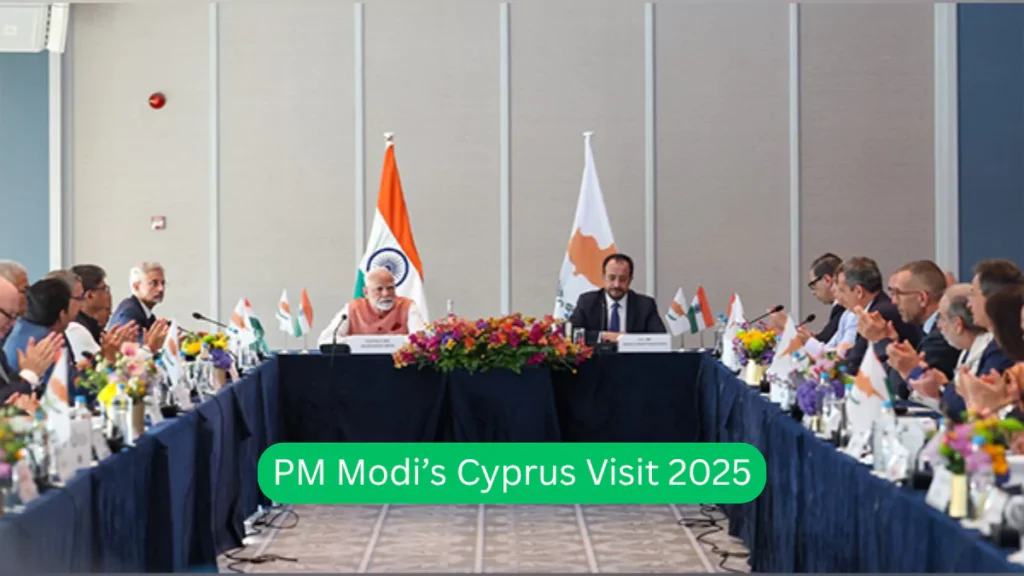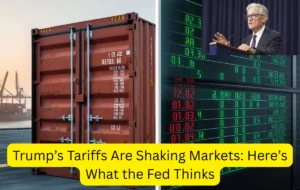PM Modi’s Cyprus Visit 2025: Why It Matters for India, and What’s the Turkey Connection?
Prime Minister Narendra Modi’s arrival in Cyprus on June 15, 2025, marked a historic milestone, being the first visit by an Indian PM to the Mediterranean island nation in over 23 years. Greeted warmly by President Nikos Christodoulides at Larnaca airport, Modi’s two-day visit is the first leg of a three-nation tour that includes Canada for the G7 Summit and Croatia. This strategic stopover is seen as a calculated move to counter the growing Turkey-Pakistan alignment while deepening India’s ties with the European Union (EU) and the Mediterranean region. As Cyprus prepares to assume the EU Council presidency in 2026, Modi’s visit underscores India’s ambitions to bolster trade, security, and diplomatic partnerships. Here’s why Cyprus matters to India and the significance of the Turkey angle.

A Historic Visit to Strengthen India-Cyprus Ties
Modi’s visit, the first since Atal Bihari Vajpayee’s trip in 2002, signals a renewed focus on India-Cyprus relations. In Nicosia, Modi held high-level talks with President Christodoulides, discussing trade, investment, defence, and technology cooperation. He also addressed business leaders in Limassol, Cyprus’ financial hub, emphasizing untapped potential in bilateral economic ties. “This visit will add significant momentum to India-Cyprus relations,” Modi said, touched by Christodoulides’ personal gesture of welcoming him at the airport.
The Ministry of External Affairs (MEA) describes Cyprus as a “dependable friend,” noting its consistent support for India’s global aspirations, including a permanent UN Security Council (UNSC) seat, membership in the Nuclear Suppliers Group (NSG), and endorsement of the India-US Civil Nuclear Agreement. Cyprus, an EU member despite its Asian geography, condemned the April 22, 2025, Pahalgam terror attack and pledged to raise Pakistan’s cross-border terrorism at EU-level discussions, aligning with India’s stance.
Why Cyprus Matters to India
Cyprus, a small island nation in the eastern Mediterranean near Turkey and Syria, holds strategic importance for India due to three key factors:
- Geopolitical Leverage Against Turkey-Pakistan Axis:
- Turkey’s growing alignment with Pakistan, especially after India’s Operation Sindoor in May 2025, has strained India-Turkey ties. Operation Sindoor targeted terror hubs in Pakistan and PoK following the Pahalgam attack, which killed 26. Turkey’s support for Pakistan, including supplying drones used against India, crossed a red line for New Delhi.
- Cyprus, locked in a decades-long territorial dispute with Turkey since the 1974 invasion, is a natural ally. The island remains divided, with the northern third controlled by the Turkish Republic of Northern Cyprus (TRNC), recognized only by Turkey. India supports resolving the Cyprus issue through UNSC resolutions and international law, aligning with Cyprus against Turkey’s regional influence.
- Energy and Economic Opportunities:
- Cyprus is a key player in eastern Mediterranean natural gas exploration, a sector fraught with tensions due to Turkey’s drilling activities. As India seeks to diversify its energy sources, partnerships with Cyprus could enhance energy security.
- Cyprus is among India’s top sources of foreign direct investment (FDI), bolstered by a Double Taxation Avoidance Agreement (DTAA). Modi’s engagement with Cypriot business leaders aims to boost trade and investment, with Cyprus serving as a gateway to the EU market.
- The India-Middle East-Europe Economic Corridor (IMEC) positions Cyprus as a vital node for East-West connectivity, aligning with India’s Viksit Bharat 2047 vision.
- Strategic EU Partnership:
- With Cyprus set to assume the EU Council presidency in the first half of 2026, Modi’s visit strengthens India’s engagement with the EU. Cyprus’ support for India’s global initiatives, including UNSC reforms and NSG membership, enhances India’s traction in Brussels.
- Defence cooperation is also on the agenda, with Cyprus seeking India’s assistance amid security challenges from Turkey. Potential areas include joint military exercises and technology transfers, building on India’s growing defence ties with Greece and Armenia, other Turkey rivals.
The Turkey Angle: A Strategic Signal
Modi’s Cyprus visit is widely seen as a diplomatic counter to the Turkey-Pakistan axis. Turkey’s vocal support for Pakistan on Kashmir and its military assistance during Operation Sindoor, including drones used in attacks, have angered India. In contrast, Cyprus has consistently backed India on terrorism and Kashmir, condemning Pakistan’s actions.
The visit sends a “specific message” to Ankara, as noted by diplomatic sources, leveraging Cyprus’ rivalry with Turkey to subtly pressure the Turkey-Pakistan alignment without direct confrontation. India’s alignment with Cyprus, Greece (visited by Modi in 2023), and Armenia forms a strategic encirclement of Turkey, bolstered by shared interests in counter-terrorism and maritime security. X posts highlight this sentiment, with one user calling it a “direct attack” on the Turkey-Pakistan axis, emphasizing Cyprus’ role as a Mediterranean ally.
Broader Geopolitical Context
Modi’s Cyprus visit is his first foreign trip since Operation Sindoor, underscoring India’s intent to consolidate international support against cross-border terrorism. “This three-nation tour is an opportunity to thank partner countries for their steadfast support in our fight against terrorism,” Modi said before departing.
The visit follows External Affairs Minister S Jaishankar’s recent trip to France and Belgium, signaling India’s push to build bridges with Europe. Cyprus’ upcoming EU presidency makes it a timely partner to advance India’s global initiatives, including the IMEC and UNSC reforms. The Indian diaspora in Cyprus, warmly greeting Modi in Limassol, further strengthens people-to-people ties.
From Cyprus, Modi heads to Kananaskis, Canada, for the G7 Summit (June 15–17), where he will discuss energy security, critical minerals, and the Israel-Iran conflict, advocating dialogue and diplomacy. The final leg in Croatia, the first-ever visit by an Indian PM, will deepen ties with another EU member, reinforcing India’s European outreach.
Tips for Staying Updated
- Follow News Platforms: Track platforms like indianexpress.com, news18.com, or timesnownews.com for real-time updates on Modi’s tour.
- Engage on Social Media: Follow @MEAIndia, @narendramodi, or @ani_digital on X for official statements and insights. Posts on X highlight the visit’s economic focus, with a business roundtable as the first event.
- Understand Geopolitics: Explore resources on the Cyprus-Turkey conflict or IMEC to grasp the visit’s strategic context.
A Strategic Milestone for India
PM Modi’s Cyprus visit on June 15–16, 2025, is a masterstroke in India’s foreign policy, countering the Turkey-Pakistan axis while cementing ties with a key EU and Mediterranean partner. By leveraging Cyprus’ geopolitical rivalry with Turkey, India sends a clear message to Ankara, strengthens its energy and defence partnerships, and positions itself for greater EU influence ahead of Cyprus’ 2026 presidency. As Modi engages with Cypriot leaders and business tycoons, this historic visit paves the way for a stronger, more connected India-Cyprus partnership, aligning with the vision of a Viksit Bharat by 2047.
Disclaimer: This article is for informational purposes only and based on reliable sources, including Indian Express, CNN-News18, and Times Now. For the latest updates, visit indianexpress.com or mea.gov.in.
Also Read: Indian Stock Market Sensex, Nifty 50 Drop Over 1% This Week – Will the Correction Deepen?






